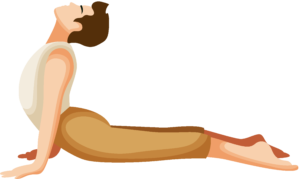Upward Facing Dog (Urdhva Mukha Svanasana)
Pose Overview
| Common Name | Upward Facing Dog |
| Traditional Sanskrit Name | Urdhva Mukha Svanasana |
| Sanskrit Name Pronunciation | oord-vah moo-kah shvah-nah-sah-nah |
| Pose Difficulty | Intermediate |
| Drishti
Drishti is the gaze or visual focus point during yoga poses.
Learn more about Drishti |
Upward, towards the sky |
Upward Facing Dog Pose, or Urdhva Mukha Svanasana in Sanskrit, is a yoga pose that is said to be beneficial for stretching out the chest, shoulders, and abdominal muscles, as well as for promoting a sense of balance and focus. The name of the pose comes from the fact that it resembles an upward facing dog, with the body in a prone position and the arms and legs extended, and the chest lifted up. The pose is said to be helpful for increasing flexibility and strength in the chest, shoulders, and abdominal muscles, and for promoting a sense of balance and focus. It is also said to be beneficial for relieving stress and anxiety, and for promoting a sense of inner peace. This pose is also said to help to release tension in the chest, shoulders, and abdominal muscles, and to help to improve balance and stability.
Benefits of Upward Facing Dog
Upward Facing Dog is a great pose for strengthening the upper body and core, as well as stretching the chest and shoulders. It can also help to improve posture and relieve tension in the back and neck.
How to Enter Upward Facing Dog
Start on your hands and knees with your wrists directly under your shoulders and your knees directly under your hips. Tuck your toes under and lift your hips up, straightening your arms and legs. Press into your hands and lift your chest towards the ceiling, keeping your gaze forward. Keep your shoulders relaxed and away from your ears. Hold the pose for a few breaths before releasing.
How to Exit Upward Facing Dog
Slowly lower your hips back down to the mat, coming back to a hands and knees position. Release your toes and relax your body.
Common Upward Facing Dog Modifications & Variations
If you have tight shoulders, you can keep your elbows close to your sides and not straighten your arms fully. To increase the intensity of the pose, you can lift your hips higher and press more firmly into your hands. For a gentler variation, you can come into the pose from a Cobra Pose (Bhujangasana) instead of starting on your hands and knees.
Common Mistakes with Upward Facing Dog
Arching the lower back too much Pushing the shoulders to ears not engaging the core Not keeping the elbows close to the body
Safety Guidance
Practice this pose with caution if you have a neck injury or wrist injury. Avoid this pose if you have lower back pain or carpal tunnel syndrome. As you come into the pose, be sure to keep your shoulders relaxed and away from your ears.

